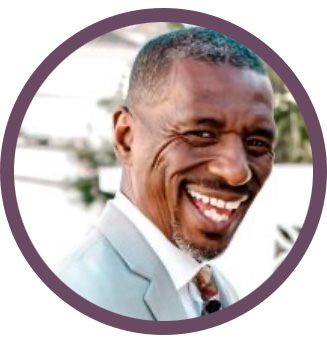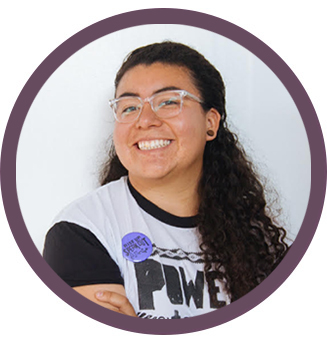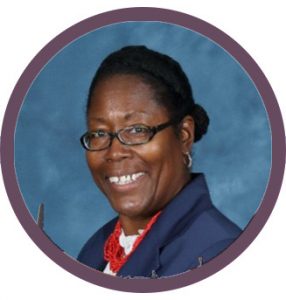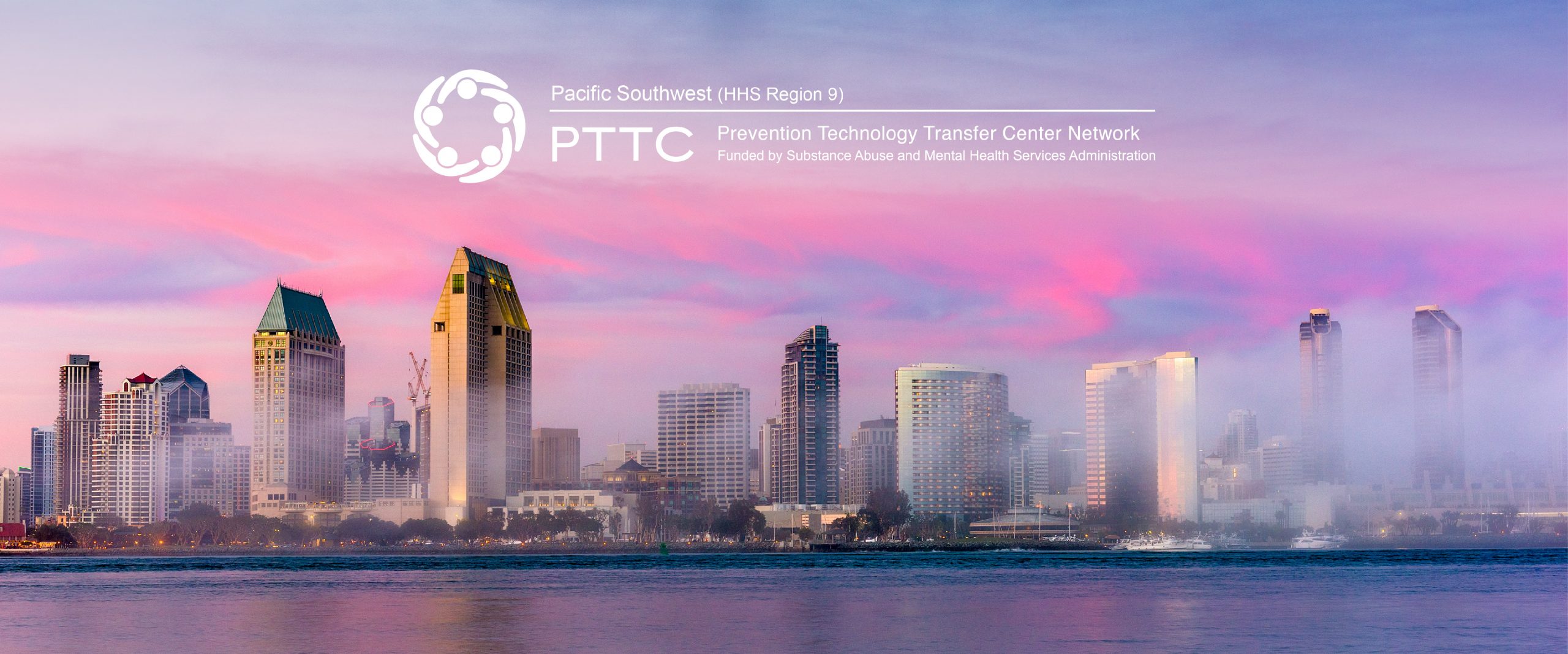Annual Prevention Academy
May 23-25, 2023 | San Diego, CA
We’re excited to announce that the Pacific Southwest PTTC’s third Annual Prevention Academy will be held in San Diego, CA, May 23-25, 2023! Featuring workshops, keynote speakers, and networking opportunities, participants will leave with new skills and strategies to amplify prevention through a health equity lens.
Event Details
- May 23, 2023: 8:30 am – 5:00 pm
- May 24, 2023: 8:30 am – 5:00 pm
- May 25, 2023: 8:30 am – 5:00 pm
The Academy will be held at Bahia Resort Hotel in San Diego, CA.
Bahia Resort Hotel
998 West Mission Bay Drive
San Diego, CA 92109
Be sure to secure your registration before booking your room.
After registering, you will receive a confirmation email that includes the link to reserve a room in our hotel room block at a discounted rate of $181/night plus taxes and fees.
Learn more in the Travel & Lodging Details tab, below.
Participation is limited to those working in HHS Region 9 to delay the initial onset of substance use and prevent substance misuse. Registration is limited to those who work in HHS Region 9.
HHS Region 9 includes: American Samoa, Arizona, California, Commonwealth of the Northern Mariana Islands, Federated States of Micronesia, Guam, Hawaii, Nevada, Republic of the Marshall Islands, and the Republic of Palau.
Prevention Academy attendees will receive certificates of participation with 19 contact hours that can be submitted to your state or jurisdiction IC&RC-affiliated certification board to apply towards Prevention Specialist certification or recertification. Certification board requirements vary, so be sure to confirm with your board that it meets their specific certification requirements. Partial credit is not available.
We will have a networking table at this event. We invite participants to bring any resources they would like to display and share with others.
Workshop Options
Participants will select two workshops to participate in during the Prevention Academy. Our overall theme of health equity will be woven throughout each workshop.
Facilitator: Nicole M. Augustine
This learning journey will cover three topics:
- Equity in Data – How we collect, analyze, and share data affect our work on many levels. How can we strategically focus our services if we don’t accurately identify the structural inequities in our communities? This section will explore the history of research and data collection and explore ways of creating trust in communities, as data is foundational to allocating resources and advocating for change.
- Equity in People – Human capacity is twofold and includes the diversity and inclusion of a variety of experiences at the “table”, and the diversity of resources in the community to address the community needs. This section will also provide each participant with an opportunity to explore their personal culture, unconscious bias, and the impact on our belief systems and ultimately our actions.
- Equity in Action – Developing cultural adaptations while using evidence-based interventions can be a challenge. We will discuss how to embed equity into program planning to ensure the co-creation of projects with community members. This session will also highlight personal action steps that support equity in action; culminating with a discussion on how equity in action connects directly with staff roles and responsibilities
Facilitator: Albert H. Gay, MS
Successful prevention efforts hinge on the capacity of the community to address the needs uncovered during the assessment phase of the Strategic Prevention Framework (SPF). A truly equitable needs assessment factors in the unjust distribution and access to resources that impact the Social Determinants of Health (SDOH); thus, contributing to the vulnerable status of certain populations.
During this session, we will focus on the community process of assessing and increasing readiness to mobilize key stakeholders to leverage their resources upstream in the addressing of inequities. Participants will take an exploratory look at the environment to see how restrictions of resources led to the creation of vulnerabilities for populations and communities. Participants will learn how to navigate the social context of their communities in order to create opportunities for awareness raising and engagement of key stakeholders for capacity building.
Facilitator: Scott Gagnon
Cannabis policy is rapidly changing and evolving in our states, jurisdictions, and communities. It is more important than ever for prevention professionals to have some level of cannabis policy literacy to shape and implement effective cannabis prevention strategies. This includes considering cannabis policy and prevention approaches that minimize health disparities in our communities. This interactive course will provide participants with an opportunity to receive content and practice skills to begin or further develop comfort with integrating cannabis policy understanding into prevention planning.
Facilitator: Carlton Hall
Transformational leadership is a theory of leadership where a leader works with teams to identify needed change, creating a vision to guide the change through inspiration, and executing the change in tandem with committed members of a group (ex, a coalition). Transformational leaders typically perform four distinct behaviors, also known as the four I’s. These behaviors are inspirational motivation, idealized influence, intellectual stimulation, individualized consideration. Intended for experienced professionals, this interactive course will provide a foundational conversation placing the idea of transformational prevention leadership in the context of cultural humility, inequity and social justice. It will provide opportunities for the practical application of those tools for the prevention professional. This interactive course will provide a foundational conversation placing the idea of transformational prevention leadership in the context of cultural humility, inequity and social justice. It will provide opportunities for the practical application of those tools for the prevention professional.
Facilitators and Speakers
More information coming soon.

Nicole M. Augustine is the Founder & CEO RIZE Consultants, Inc, a strategic consulting firm founded in January 2015. Nicole is an entrepreneur, public health professional and social justice advocate. Her journey in public health began at Cornell University when after graduating she worked for three years as a BASICS counselor for Cornell’s campus harm reduction initiative. From there, Nicole transitioned into the George Washington University School of Public Health before experiencing a rapid career progression from providing prevention education to providing training and technical assistance to communities, professionals and state agencies.
In addition to managing RIZE Consultants, Nicole serves as an Advanced Implementation Specialist with the Opioid Response Network and a consultant to the Prevention Technology Transfer Center. Nicole is a passionate prevention thought leader with a desire to be of greater impact and drive community change through innovative strategies. This passion for society change fuels the business that she founded: RIZE Consultants.
In August 2022, Nicole published the Prevention Specialist Exam Study Guide to help readers understand the competencies and knowledge necessary to become a Prevention Specialist (PS) and adequately prepare prevention professionals to pass the Prevention Specialist certification exam.

Albert Gay is a national trainer and consultant in the field of substance use prevention. He has worked with governmental agencies, as well as with Indiana University’s School of Public Health as an Education and Training Specialist and Research Associate with the Prevention Insights. In this position, he coordinates substance use and HIV prevention strategies and training. Nationally, he has trained the behavioral health workforce, the United States military, and diverse population groups and community coalitions in the Strategic Prevention Framework. Locally, Albert was the coordinator for a Communities That Care coalition; and currently, he is the chair of a county council and a key stakeholder for a city-wide coalition (both of which are Drug-Free Communities Coalitions). Besides prevention, his other areas of interest include youth work, faith-based initiatives, mental health promotion, social justice, cultural competence, historical trauma, organizational development, and strategic planning.

Scott Gagnon is a Certified Prevention Specialist, Associate Executive Director of AdCare Educational Institute of Maine, Inc., and Director of SAMHSA’s New England Prevention Technology Transfer Center (PTTC). Scott is a national speaker and trainer on cannabis policy and prevention, as well as other topics including opioid prevention, and prevention workforce development. Scott has previously served as Chair of the national PTTC Network Cannabis Prevention Work Group. Scott serves as a board member of the Maine Recovery Coach Certification Board and is a member representing public health on Maine’s Cannabis Advisory Commission. Scott has previously served as Co-Chair of the Prevention Task Force for the Maine Opiate Collaborative, and has also previously served on the SAMHSA, Center for Substance Abuse Prevention National Advisory Council. Scott is currently serving as a subject matter expert advisor for the documentary series, Voices of Hope: The Rugged Road to Recovery, airing on Maine Public television.
Scott’s work has been recognized with awards from multiple organizations, including the Maine Alliance to Prevent Substance Abuse, Healthy Androscoggin, and the Maine Public Health Association. In 2017, Scott was the recipient of the Patrick J. Kennedy Outstanding Advocate Award from Smart Approaches to Marijuana.

Carlton Hall is the President and CEO of Carlton Hall Consulting LLC (CHC), a multi-faceted, full-service consulting firm designed to provide customized solutions and enable measurable change for communities, organizations, families and individuals. Carlton Hall has been providing intensive substance abuse prevention focused and community problem solving services to the nation for the last 25 years. His responsibilities, unique set of skills and experience have made him one of the most highly sought after instructors and guides for community problem solving across the nation and internationally, with successful achievements in South Africa, Ghana, Bermuda, Kenya and others. CHC is honored to be invited to contribute to annual convenings of The Commission on Narcotic Drugs (CND), the governing body of the United Nations Office on Drugs and Crime (UNODC). CHC has co-organized, delivered and participated in side-meetings and special events.
Carlton spent twelve years with the Community Anti-Drug Coalitions of America (CADCA) serving in several leadership positions and including most recently, Acting Vice President, Training Operations, and Acting Director for CADCA’s National Coalition Institute.
Currently, Carlton and the CHC team provide executive training and technical assistance support to the Southeast PTTC (Region 4).
Additionally, Carlton sits on several boards of directors, including, the National Alliance for Drug Endangered Children (NA-DEC) and Movendi International.

Captain Emily Williams, LCSW-PIP, BCD is the Regional Administrator for the Substance Abuse and Mental Health Services Administration in U.S. Department of Health and Human Services Region IX. Her career has focused on underserved populations and has spanned more than 20 years of service delivery of Behavioral health services within the Indian Health Service and DOD. From working as a clinician in remote clinics to standing up an telephone Outreach Center for Active Duty family members and Veterans her ability to work with individuals and communities has strengthened the suicide prevention and crisis response in local, state and national arenas.
Since her commission as a United States Public Health Service officer in 2004, CAPT Williams has served a central role in conceptualizing, developing, and training federal mental health disaster response teams within the USPHS. She has served as a team leader and deployed to numerous public health emergencies including hurricanes, multiple Tribal behavioral health emergencies, the 2010 American Samoan Tsunami and coordinated deployments to assist hospitals with accreditation support. She resides in Alameda, CA with her family.

Mayra Jimenez has a background in environmental prevention, grassroots community engagement and health equity advocacy. She is a community organizer and facilitator by training, an advocate for social justice and reparations at heart. Over the past 10 years, Mayra’s work has centered on partnership and alliances with organizations and activists across Los Angeles, California, nationally and internationally. Her expertise centers around evidence-based strategies to address Alcohol and Other Drug (AOD) Substance Use Prevention at the intersection of human rights, environmental justice, indigenous autonomy and liberation movements by way of corporate accountability.
 Dr. Mary C. Roary is a knowledgeable and motivated leader and public health epidemiologist with lived experience and expertise in diversity, equity, and inclusion, infectious and chronic diseases, research methodology, biostatistics, public health, business, and policy respectively. Currently, Dr. Roary is the Chief Equity Officer for HHS Substance Abuse and Mental Health Services Administration (SAMHSA) where she is responsible for building a Diversity, Equity, Inclusion, and Accessibility (DEIA) strategy and implementing the strategy with measurable milestones that map to current Administration Executive Orders. Moreover, identifying and providing remedies for behavioral health disparity data gaps for under-resourced populations. Dr. Roary was the former Director of SAMHSA’s Office of Behavioral Health Equity. There she was responsible for providing oversight of the agency’s DEIA portfolio and developing and implementing a Strategic Plan to maximize behavioral health access across SAMHSA’s care continuum of promotion, prevention, recovery, and treatment of under-resourced populations through 3 Centers of Excellence and a Nationwide Network of over 1400 Community-Based Organizations. Dr. Roary was the former Program Administrator Officer for the IDeA States Network / ECHO Opportunities and Infrastructure Fund. Dr. Roary was also a Program Director Administrator for the NIH NINR. There she was responsible for overseeing the scientific portfolios of Health Promotion, Disease Prevention, Environmental Influences, and Health Disparities. Additionally in the Program Director and Officer roles Dr. Roary’s analytical expertise substantially contributed to the past efforts to advance the Office of Minority Health’s (OMH’s) contributions to developing, formulating, implementing, and monitoring data provisions in the Patient Protection and Affordable Care Act. Prior to coming to DHHS, Dr. Roary worked on medical and mental health disease management and cost modeling contracts at the Lewin Group and was Co-PI for multiple chronic disease community-based participatory research grants and contracts at Johns Hopkins University and the University of Arizona. Dr. Roary has designed questionnaires, managed research teams and large medical and pharmaceutical grants and contracts and has taught graduate-level courses in epidemiology and statistics. Her doctoral studies, which focused on community-based strategies to decrease diabetes disparities in the minority (US-Mexico Border) underserved communities, were published as a book. Additionally, she has been responsible for developing scientific Funding Opportunity Announcements for rural and other under-resourced populations, writing grants, identifying funding sources, preparing papers and reports, and disseminating and presenting scientific results to various governmental and non-governmental stakeholders, and state, and local groups. She received her undergraduate from Morgan State University, several master’s degrees from Johns Hopkins University, and her doctorate from the University of Arizona where she was an epidemiology and biostatistics CDC fellow.
Dr. Mary C. Roary is a knowledgeable and motivated leader and public health epidemiologist with lived experience and expertise in diversity, equity, and inclusion, infectious and chronic diseases, research methodology, biostatistics, public health, business, and policy respectively. Currently, Dr. Roary is the Chief Equity Officer for HHS Substance Abuse and Mental Health Services Administration (SAMHSA) where she is responsible for building a Diversity, Equity, Inclusion, and Accessibility (DEIA) strategy and implementing the strategy with measurable milestones that map to current Administration Executive Orders. Moreover, identifying and providing remedies for behavioral health disparity data gaps for under-resourced populations. Dr. Roary was the former Director of SAMHSA’s Office of Behavioral Health Equity. There she was responsible for providing oversight of the agency’s DEIA portfolio and developing and implementing a Strategic Plan to maximize behavioral health access across SAMHSA’s care continuum of promotion, prevention, recovery, and treatment of under-resourced populations through 3 Centers of Excellence and a Nationwide Network of over 1400 Community-Based Organizations. Dr. Roary was the former Program Administrator Officer for the IDeA States Network / ECHO Opportunities and Infrastructure Fund. Dr. Roary was also a Program Director Administrator for the NIH NINR. There she was responsible for overseeing the scientific portfolios of Health Promotion, Disease Prevention, Environmental Influences, and Health Disparities. Additionally in the Program Director and Officer roles Dr. Roary’s analytical expertise substantially contributed to the past efforts to advance the Office of Minority Health’s (OMH’s) contributions to developing, formulating, implementing, and monitoring data provisions in the Patient Protection and Affordable Care Act. Prior to coming to DHHS, Dr. Roary worked on medical and mental health disease management and cost modeling contracts at the Lewin Group and was Co-PI for multiple chronic disease community-based participatory research grants and contracts at Johns Hopkins University and the University of Arizona. Dr. Roary has designed questionnaires, managed research teams and large medical and pharmaceutical grants and contracts and has taught graduate-level courses in epidemiology and statistics. Her doctoral studies, which focused on community-based strategies to decrease diabetes disparities in the minority (US-Mexico Border) underserved communities, were published as a book. Additionally, she has been responsible for developing scientific Funding Opportunity Announcements for rural and other under-resourced populations, writing grants, identifying funding sources, preparing papers and reports, and disseminating and presenting scientific results to various governmental and non-governmental stakeholders, and state, and local groups. She received her undergraduate from Morgan State University, several master’s degrees from Johns Hopkins University, and her doctorate from the University of Arizona where she was an epidemiology and biostatistics CDC fellow.
Travel and Lodging
Please be sure to secure your registration for this event prior to making our travel arrangements.
Please use the following link to make room reservations: Bahia Resort Hotel Reservations
Upon arrival/check-in at the hotel, the traveler will need to present a credit card for room, tax, incidentals, and hotel fees.
Room Rate: $181.00 per night plus taxes and hotel fees
*Please note, the Single and Double rate at Bahia Hotel Resort is $181.00/night within our room block. Our room block is limited and available on a first come, first serve basis, so please make your room reservations as soon as you can. To receive the special discounted group rate, reservations must be made by April 21, 2023.
Transportation from San Diego International Airport (SAN) to Hotel/Meeting Location:
Taxis:
If you need a taxi, simply follow the signs leading to the Transportation Plazas. A Customer Service Representative will place you with the first available taxi, unless you specify a particular taxicab company.
Ride Share:
Terminal 1: Travelers will exit baggage claim, use the new pedestrian crosswalk, with a traffic light to provide access to Ground Transportation resources (VFH, Courtesy, Taxis, Rideshare and RCC). See signage for assistance.
Terminal 2: Upon exiting baggage claim, use main crosswalk to Transportation Plaza. Ridesharing pick-up is located in the second lane on the right. See signage for assistance.
The Bahia Resort Hotel is providing complimentary self-parking (valued at $35.00 per day) based on space availability.
Participants need to purchase all of their own meals. No meals will be provided.

